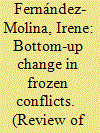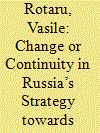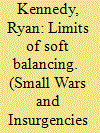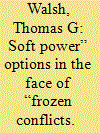| Srl | Item |
| 1 |
ID:
164985


|
|
|
|
|
| Summary/Abstract |
This article proposes a typology of causal mechanisms whereby transnational relations of recognition constitute conflict actors in frozen conflicts. While the agency of an emerging conflict actor manifests itself in ‘struggles for recognition’ motivated by experiences of ‘disrespect’, responses from different significant others vary in terms of motivations and pathways (mechanisms of recognition). Adapting Honneth’s tripartite division, the typology distinguishes between four forms of recognition: thin cognitive recognition, ‘respect’/rights, ‘esteem’/difference, and ‘love’/empathy. Three transnational corrections are made in order to include transnational relations of recognition, non-state actors, and unstructured social-relational forms of international/transnational recognition. The typology is applied to the conflict of Western Sahara, which has been reshaped by the rise of internal Sahrawi pro-independence groups (based inside the territory annexed by Morocco) as an increasingly relevant conflict actor, with their identity shifting from victims to human rights activists to activists involved in an unsolved conflict. This identity and social-status formation has been the product of transnational recognition from three significant others: the annexing state (Morocco), the contested state-in-exile (SADR), and the international community. The overall effect of intermingling recognition processes, including various instrumental initiatives deprived of mutuality, has been increased struggle and conflict complexity rather than ‘recognitional peace’.
|
|
|
|
|
|
|
|
|
|
|
|
|
|
|
|
| 2 |
ID:
188171


|
|
|
|
|
| Summary/Abstract |
The 2008 invasion of Georgia, followed by the recognition of the independence of the breakaway regions of Abkhazia and South Ossetia, the annexation of Crimea and the involvement in the war in Donbas, and the 2022 invasion of Ukraine have all marked the return to active Russian participation in separatist regions in the ‘near abroad’. They took the international community by surprise. To be sure, the Russian Federation had played a role in all previous secessionist conflicts in the former Soviet space. Nonetheless, Moscow’s post-2008 bold actions – open invasion, recognition of separatist regions and annexation of a neighbour’s territory – have marked an innovation in Russia’s foreign policy. This points to questions about how Moscow is legitimising these actions and whether the official narrative suggests a change in Russia’s strategy towards secessionist conflicts in the ‘near abroad’.
|
|
|
|
|
|
|
|
|
|
|
|
|
|
|
|
| 3 |
ID:
144778


|
|
|
|
|
| Summary/Abstract |
Both the EU and NATO have greatly expanded efforts to address the frozen conflict in Transnistria since 2003. These efforts by and large fall neatly into the category of ‘soft balancing’ actions against Russian influence in the conflict and in Moldova more generally. Given that soft balancing is normally seen as a strategy undertaken by relatively weak actors vis-à-vis a global or regional hegemon, this behavior is puzzling. The actions of these institutions demonstrate that soft balancing is a logical strategy for stronger actors when the conflict is not as salient as for the weaker actor. The EU and NATO’s desire to resolve the conflict is not salient enough to warrant a costlier hard power strategy. Recent developments in Ukraine also demonstrate the limitations of this strategy. Specifically, the application of this soft power has done little to change the incentives for separatist leaders or their Russian backers, meaning they have little ability to resolve the conflict. They have also fallen short of creating a permanent pro-Western consensus in Moldova. They do, however, augment Moldova’s ability to adapt to the challenges posed by the conflict and provide a paper wall against more aggressive Russian ambitions in the region.
|
|
|
|
|
|
|
|
|
|
|
|
|
|
|
|
| 4 |
ID:
156683


|
|
|